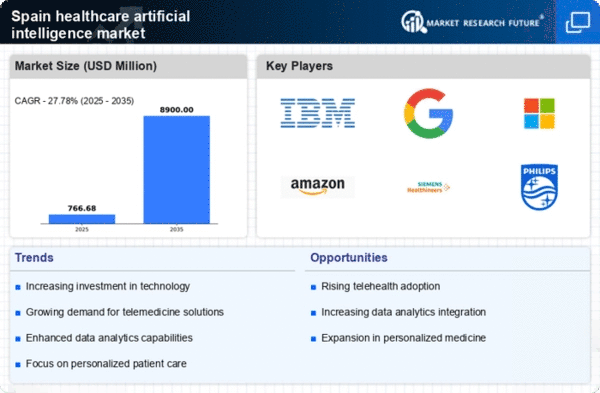Government Initiatives and Funding
Government initiatives aimed at promoting digital health solutions are playing a crucial role in the expansion of the healthcare artificial-intelligence market in Spain. The Spanish government has allocated substantial funding to support the integration of AI technologies in healthcare systems. This includes investments in research and development, as well as incentives for healthcare providers to adopt AI-driven solutions. For instance, the government has launched programs that encourage collaboration between public health institutions and technology companies, fostering innovation in AI applications. As a result, the healthcare artificial intelligence market is likely to see increased investment, which could lead to enhanced AI capabilities in diagnostics, treatment planning, and patient management. This supportive regulatory environment is expected to drive market growth and improve healthcare outcomes across the country.
Rising Demand for Telemedicine Solutions
the healthcare artificial intelligence market in Spain is experiencing a notable surge in demand for telemedicine solutions. This trend is driven by the increasing need for remote healthcare services, particularly in rural areas where access to medical facilities is limited. The integration of AI technologies into telemedicine platforms enhances diagnostic accuracy and patient monitoring, thereby improving overall healthcare delivery. According to recent data, the telemedicine market in Spain is projected to grow at a CAGR of approximately 25% over the next five years. This growth is likely to be fueled by advancements in AI algorithms that facilitate real-time data analysis and patient engagement, making telemedicine a vital component of the healthcare landscape. As a result, the healthcare artificial-intelligence market is poised to benefit significantly from this rising demand.
Advancements in Machine Learning Algorithms
Advancements in machine learning algorithms are significantly influencing the healthcare artificial-intelligence market in Spain. These innovations enable more accurate predictions and personalized treatment plans, which are crucial for improving patient outcomes. The development of sophisticated algorithms allows for better analysis of medical imaging, genomics, and patient data, leading to enhanced diagnostic capabilities. For instance, AI systems can now analyze radiological images with accuracy rates exceeding 90%, which is comparable to that of experienced radiologists. This capability not only streamlines the diagnostic process but also reduces the burden on healthcare professionals. As machine learning continues to evolve, the healthcare artificial-intelligence market is expected to grow, driven by the demand for more precise and efficient healthcare solutions.
Growing Focus on Data-Driven Decision Making
the healthcare artificial intelligence market is witnessing a growing emphasis on data-driven decision-making processes among healthcare providers in Spain. With the increasing availability of electronic health records (EHRs) and other health data, AI technologies are being leveraged to analyze vast amounts of information. This analysis aids in identifying trends, predicting patient outcomes, and optimizing treatment protocols. Recent studies indicate that healthcare organizations utilizing AI for data analysis have reported improvements in operational efficiency by up to 30%. This trend suggests that the integration of AI into clinical workflows is becoming essential for enhancing patient care and resource management. Consequently, the healthcare artificial-intelligence market is likely to expand as more institutions recognize the value of data-driven insights in improving healthcare delivery.
Increased Collaboration Between Tech and Healthcare Sectors
the healthcare artificial intelligence market is benefiting from increased collaboration between technology companies and healthcare providers in Spain. This partnership is fostering innovation and accelerating the development of AI applications tailored to meet the specific needs of the healthcare sector. By combining technological expertise with clinical knowledge, these collaborations are leading to the creation of advanced AI tools that enhance patient care and operational efficiency. For example, joint ventures between AI startups and hospitals are resulting in the deployment of AI-driven diagnostic tools that improve accuracy and speed. This trend indicates a shift towards a more integrated approach to healthcare, where technology plays a pivotal role in enhancing service delivery. As such, the healthcare artificial-intelligence market is likely to see sustained growth as these collaborations continue to flourish.
















